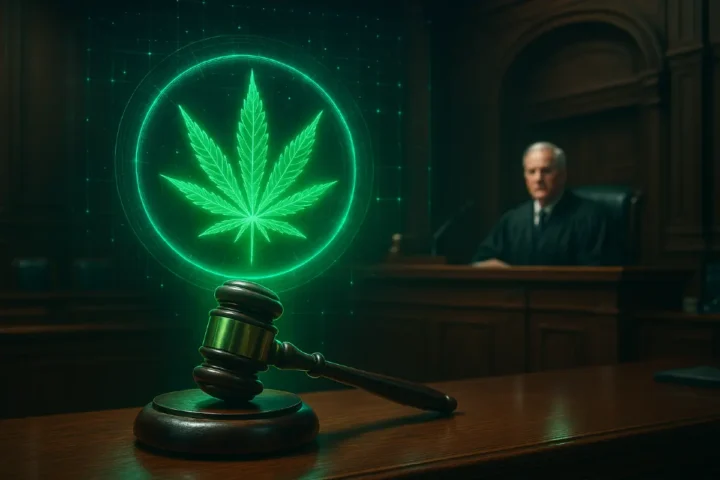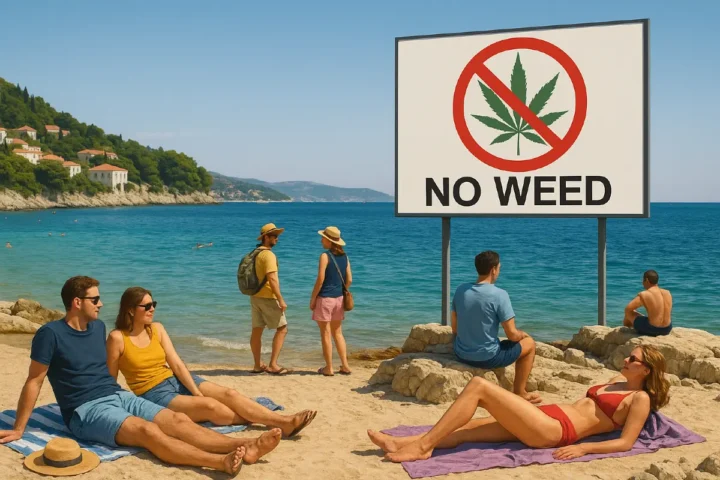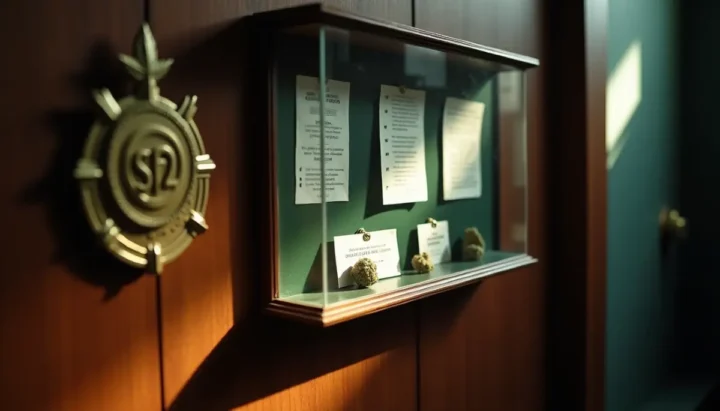Is Weed Legal in Philippines?
Is weed legal in Philippines? Cannabis remains strictly illegal in the Philippines, and the country has some of the world’s toughest drug laws. Anyone caught with just 10 grams of cannabis extract or 500 grams of flower faces life in prison, fines up to 10 million pesos, and possibly the death penalty. A 2015 Dangerous Drugs Board survey revealed that 1.8 million Filipinos still use illegal drugs despite these harsh penalties.
The Philippines’ stance on cannabis has drawn attention from travelers planning extended stays in the country. The legal situation remains tough, but some progress toward medical use has emerged. House Bill 10439 for medical cannabis passed with strong support – 177 votes in favor.

The 2024 laws still prohibit having THC metabolites in your system. Offenders must spend at least six months in a government rehabilitation center. This strict enforcement raises safety concerns for travelers who might have used cannabis legally in their home countries before visiting the Philippines.
Is Weed Legal in the Philippines in 2025?
The question “is weed legal in Philippines” has a clear answer for 2025 – marijuana remains completely banned under Philippine law. Both travelers and locals should know these strict rules since breaking them can change their lives forever.
Current Legal Status of Cannabis
The Philippines enforces one of the world’s toughest stances on cannabis possession and use. The Comprehensive Dangerous Drugs Act of 2002 (Republic Act No. 9165) serves as the main legal framework that bans all forms of marijuana. This law has stood firm for over 20 years and puts cannabis in the same category as dangerous drugs like methamphetamine.
Is weed legal in Philippines? The answer is a firm no – growing, having, using, selling, or distributing marijuana can lead to very harsh penalties. Tourists and citizens face the same laws, which affects living costs in Philippines for people used to more relaxed rules in other countries.
All the same, some recent changes deserve attention. The Philippine House of Representatives gave strong approval to House Bill 10439 in May 2024, with 177 votes supporting it, 9 against, and 9 abstentions. This bill aims to create rules for medical cannabis and set up a Medical Cannabis Office (MCO) under the Department of Health.
Senator Robin Padilla also filed the Cannabis Medicalization Act in June 2025 as one of his top 10 priority bills for the 20th Congress. But these remain just proposals – the answer to “is weed legal in the Philippines 2025” stays the same until these become law. Not shockingly, Philippines is a safe country to live in for their stance on drugs and other issues.
How the Law Defines Cannabis
Philippine law labels cannabis as a dangerous drug. The rules make no difference between various cannabis products meant for fun use. The Philippine Drug Enforcement Agency states clearly that anything from cannabis plants – including hemp seed oil and CBD products – counts as illegal.
The Philippines signed the 1961 United Nations Single Convention on Narcotic Drugs, which puts cannabis in Schedule I. This technically allows its use only for medical and scientific reasons. But even legitimate medical use faces very tight restrictions.
The latest update on weed legality in the Philippines shows that while the FDA lets epilepsy patients use CBD through the Compassionate Special Permit (CSP) system, the cost is huge – between $25,000 to $30,000 for a year’s prescription. This puts real medical access out of most Filipinos’ reach.
Is Recreational Use Allowed?
The Philippines shows zero tolerance toward recreational cannabis. The country bans recreational marijuana completely, and punishments get worse based on how much someone has. The country proves dangerous for cannabis users through strict enforcement.
Here’s how the law punishes based on quantity:
- Having 10+ grams of resin (hashish) or 500+ grams of cannabis flower: life in prison to death, plus fines from 500,000 to 10 million pesos
- Less than 10 grams of hashish or 300-500 grams of cannabis: 20 years and one day to life in prison, with fines of 400,000-500,000 pesos
- Less than 5 grams of hashish or less than 300 grams of cannabis: 12-20 years in prison, with fines of 300,000-400,000 pesos
Marijuana stands as the second most popular drug in the Philippines after methamphetamine (called “shabu” locally). People grow it mostly in remote mountain areas of Luzon and Mindanao for local use. These numbers stay high despite the tough legal consequences.

Penalties for Cannabis Use and Possession
Philippine laws hit hard when it comes to cannabis possession. These penalties rank among the world’s toughest. Anyone planning a trip to this Southeast Asian nation needs to know what these laws mean.
Possession Thresholds and Punishments
The amount of cannabis determines how severe the punishment will be. People caught with all but one of these quantities face different penalties. Anyone with 500 grams or more of marijuana (or 10 grams of marijuana resin/oil) will serve life in prison. They’ll also pay fines from PHP500,000 to PHP10 million. Those caught with 300-500 grams face 20 years and one day to life, plus fines between PHP400,000-PHP500,000.
Even smaller amounts lead to serious trouble. Having less than 300 grams of marijuana or 5 grams of resin means 12-20 years behind bars. Add to that fines from PHP300,000 to PHP400,000. These penalties can destroy someone’s life in the Philippines if they face prosecution.
Penalties for First-time Users
The Philippines doesn’t allow weed for personal use. First-time users face different consequences though. Testing positive for cannabis without possession means mandatory rehab for six months in a government facility. This only applies to use without possession cases.
Some first-time offenders might get a break. The “voluntary submission” program helps those caught with less than 500g of marijuana. They can take a six-month government program followed by two years of aftercare. Complete the program successfully and their criminal record might be cleared.
Repeat Offenses and Rehabilitation
Second-time offenders face tougher penalties. Using cannabis again means 6-12 years in prison plus fines from PHP50,000 to PHP200,000. These growing penalties show how seriously the Philippines takes its cannabis laws in 2025.
First-time offenders get most rehabilitation options. Second offenses usually mean prison time instead of rehab. The system wants to stop drug use by making each offense hurt more than the last.
Fines and Imprisonment Explained
Cannabis offenses can destroy you financially. The highest fines reach PHP10 million (about $200,000). That’s enough to bankrupt most people. Even the smaller PHP300,000 fines hit hard in a country where monthly salaries run much lower.
Cases with 500g or more of marijuana don’t qualify for bail. Quantities between 300-500g might get bail if the evidence looks weak. Only cases under 300g guarantee the right to post bail.
The Philippines’ cannabis laws haven’t changed much in 2024. Tourists often ask about safety after using cannabis in legal countries. While random drug tests aren’t common for visitors, getting caught with even tiny amounts leads to serious trouble.
Medical Marijuana in the Philippines
The Philippines strictly prohibits recreational cannabis, but support for medical marijuana legalization has grown steadily over the last few years. Many travelers want to learn about the legal status of medical marijuana in the country.
The Compassionate Medical Cannabis Act
The Philippine Compassionate Medical Cannabis Act stands as the country’s most important step toward creating a legal framework for medical marijuana. This proposed law wants to legalize and regulate cannabis for therapeutic use.
The bill has received overwhelming support in the House of Representatives, with 177 lawmakers voting in favor during its third reading in 2024. While recreational use remains illegal, this act would help patients with specific debilitating conditions access treatment.
Conditions Eligible for Treatment
The proposed legislation would allow medical cannabis treatment for several conditions. Patients with cancer, glaucoma, multiple sclerosis, epilepsy, HIV/AIDS, post-traumatic stress disorder, and rheumatoid arthritis would qualify.
Note that the bill also includes patients who have spinal cord damage with intractable spasticity and those who need hospice care. People with these conditions should consider potential treatment costs when calculating their living expenses in the Philippines.
Role of the Medical Cannabis Office (MCO)
The Department of Health would establish the Medical Cannabis Office as its main regulatory body. This office would authorize accredited physicians, monitor prescriptions, and oversee cannabis cultivation, manufacture, and distribution. The MCO would enforce strict regulations to prevent non-medical use. The bill’s future remains uncertain in 2025 as it still needs Senate approval.
Access and Prescription Process
Authorized Medical Cannabis Compassionate Centers in public tertiary hospitals would be the only places to get medical cannabis. Patient safety depends on following strict protocols – only pharmacists with special S2 licenses could dispense cannabis, and prescriptions would last one month. Physicians must complete specialized training in cannabis pharmacology, dosing, and potential risks.
Challenges in Implementation
The 2024 update reveals several major hurdles. CBD oil (a non-psychoactive cannabis component) costs between $25,000-$30,000 for a year’s supply. The medical community remains split, and some doctors worry about potential abuse.
Social stigma and bureaucratic obstacles make medical cannabis access difficult. The Philippine Drug Enforcement Agency continues to classify all cannabis derivatives as illegal under current law.
Is CBD Legal in the Philippines?
CBD products have become popular worldwide, but travelers often ask about CBD’s legal status in the Philippines. The answer is a clear no across the board.
CBD vs THC: Legal Distinction
Philippine law sees little difference between CBD and THC. The Philippine Drug Enforcement Agency (PDEA) has banned the purchase or use of any cannabis derivatives, including hemp seed oil and CBD. Many countries separate psychoactive THC from non-psychoactive CBD, but Philippine regulations treat them the same way. CBD has very low THC levels (usually 0.1-0.2%) but stays classified in the same category as marijuana.
Epidiolex and FDA-Approved Use
The Philippine Dangerous Drugs Board allowed the use of cannabidiol (CBD) for epilepsy patients in February 2020. This exception applies only to Epidiolex, an FDA-approved medicine with purified CBD. Doctors prescribe it to treat seizures linked to Lennox-Gastaut syndrome and Dravet syndrome in patients 2 years and older. This marks the first step toward accepting CBD’s medical benefits, though broader restrictions remain.
Why CBD Remains Restricted
The 2025 outlook shows CBD stays restricted because current laws ban all cannabis derivatives. Changes might happen since the Department of Health supports limited medical cannabis legalization. The World Health Organization finds CBD has no abuse potential and poses no public health risks, but Philippine legal frameworks haven’t adapted to these findings.
Cost and Accessibility Issues
Medical needs and living costs in the Philippines face major hurdles with CBD access. Approved marijuana through Epidiolex costs $25,000-$30,000 yearly. This price tag makes it out of reach for most families, given their average annual income was just $2,693 in 2021.
The 2024 update shows patients need special FDA permits and must submit doctor letters with medical abstracts. These requirements make CBD access nearly impossible for most people.

Can You Grow, Sell, or Import Cannabis?
The Philippines takes a strong stance against cannabis cultivation with a clear message – it’s completely illegal. The government enforces these laws with zero tolerance.
Laws on Cultivation and Land Seizure
Growing marijuana plants in the Philippines comes with harsh penalties – life imprisonment to death, plus fines ranging from PHP500,000 to PHP10 million. The government automatically seizes any land used to grow cannabis.
Landowners must prove they didn’t know about marijuana growing on their property. Police destroyed PHP15.2 million worth of marijuana plants last month – about 76,000 plants on a 7,600 square meter plantation in Kalinga.
Selling and Distributing Cannabis
Drug dealers face life imprisonment or death along with heavy fines. The law punishes anyone who helps or protects cannabis sellers with 12-20 years in prison. These penalties would crush someone’s ability to live in the Philippines.
Importing Cannabis or Seeds
Bringing any cannabis products into the country carries the same harsh penalties as growing it. The 2025 laws show no signs of changing. This ban covers all seeds too – you can’t buy them, use them, or mail them legally.
Penalties for Commercial Intent
The 2024 legal update shows harsher punishment for business-related cannabis activities. People who organize, manage, or fund these operations get maximum penalties. The Philippines stands as one of the world’s toughest countries on cannabis, making it completely unsafe for anyone thinking about cannabis-related business ventures.
Is Weed Legal in Philippines Frequently Asked Question
Is Cannabis Legal in the Philippines?
No, cannabis is completely illegal in the Philippines. The country has some of the strictest anti-drug laws in the world, with severe penalties for possession, use, sale, and cultivation of marijuana.
What are the Penalties for Cannabis Possession in the Philippines?
Penalties are extremely harsh and depend on the quantity possessed. For less than 300 grams, you can face 12–20 years in prison and fines up to 400,000 pesos. Larger amounts can result in life imprisonment or even the death penalty.
Is Medical Marijuana Legal in the Philippines?
Currently, medical marijuana remains illegal. However, there have been recent legislative efforts to legalize cannabis for medical use, though implementation faces significant challenges.
Can Tourists Use Cannabis in the Philippines?
Absolutely not. Tourists are subject to the same strict laws as residents. Using cannabis as a visitor could result in severe legal consequences, including lengthy prison sentences.
Is CBD Legal in the Philippines?
No, CBD is not legal in the Philippines. The country makes no distinction between CBD and THC-containing products—both are prohibited under current law, with very limited exceptions for specific medical conditions.
Can You Grow Cannabis at Home in the Philippines?
No, cultivating cannabis at home is strictly illegal in the Philippines. Growing even a single plant can lead to life imprisonment or other severe penalties.
Are There Any Legal Exceptions for Cannabis Use in the Philippines?
There are very limited exceptions for cannabis-derived medicine used in rare medical cases, but these require strict government approval and are rarely granted.
How Does the Philippines Enforce Its Cannabis Laws?
The Philippines enforces cannabis laws aggressively through police operations, strict border control, and harsh judicial sentencing, making possession or use extremely risky.
What is the Public Opinion on Cannabis in the Philippines?
Public opinion is largely conservative, with most citizens supporting strict drug laws. However, advocacy groups continue to push for medical cannabis legalization.
Can You Bring Cannabis Products into the Philippines from Abroad?
No, bringing cannabis or cannabis-infused products into the Philippines is illegal. Travelers caught attempting to import them face severe criminal charges.


